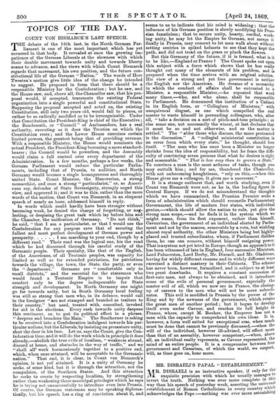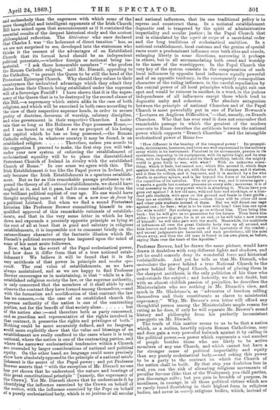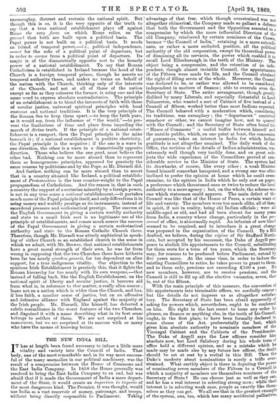MR. DISRAELI'S PAPAL "ESTABLISHMENT."
yiR. DISRAELI is an instructive speaker, if only for the exquisite precision with which he usually manages to invert the truth. Nothing was ever more complete in this way than his speech of yesterday week, asserting the universal establishment of Roman Catholicism in every country which acknowledges the Pope :—nothing was ever more astonishing and melancholy than the eagerness with which some of the more thoughtful and intelligent opponents of the Irish Church Bill have seized upon that announcement as if it contained the essential results of the deepest historical study and the acutest philosophical reflection. The litarateur who once declared that Charles L was "the holocaust of direct taxation" has, as we are not surprised to see, developed into the statesman who thinks it the essence of the advantages of an Established Church that its formal head should be an independent political potentate,—whether foreign or national being immaterial. "I ask those honourable members" "who profess the Roman Catholic religion," said Mr. Disraeli, appealing to the Catholics, "to permit the Queen to be still the head of the Protestant Episcopal Church. Why should they refuse to their countrymen the undoubted advantage which they admit they derive from their Church being established under the supreme will of a Sovereign Pontiff? I have shown that it is the supremacy of the Queen that is to be destroyed by the second clause of this Bill,—a supremacy which exists alike in the case of both religions, and which will be exercised in both cases according to the view of their respective supreme heads, in order to secure parity of doctrine, decorum of worship, salutary discipline, and wise government in their respective Churches. I maintain that so long as His Holiness the Pope possesses Rome,— and I am bound to say that I see no prospect of his losing that capital which he has so long possessed,—the Roman Catholic religion, in whatever country it may be found, is an established religion Therefore, unless you accede to the suggestion I proceed to snake, the first step you will take under your new system of enforcing the establishment of ecclesiastical equality will be to place the disestablished Protestant Church of Ireland in rivalry with the established Church of Rome." In one sense we agree with this. The Irish Establishment is too like the Papal power in Ireland, yet only because the Irish Establishment is a spurious establishment. But so far as this remarkable passage professes to expound the theory of all national establishments, we should have laughed at it, and let it pass, had it come exclusively from the one brilliant political sophist of our age. No one would have thought anything more of it than of a new tour de force by a political Leotard. But when we find a sound Protestant historian like Professor Brewer committing himself to unqualified approval of this remarkable rationale of establishments, and that in the very same letter in which he lays down and expounds a precisely opposite principle as lying at the root of all at least that is good and salutary in religious establishments, it is impossible not to comment briefly on the extraordinary character of the fantastic illusion which Mr. Disraeli's political necromancy has imposed upon the mind of some of his most acute followers.
Now, what is the secret of the Papal ecclesiastical power, and how does it differ from that of a true national establishment? We believe it will be found that it is the very antithesis of that power in principle and modus operandi. The real value of establishments, as we have always maintained, and as we are happy to find Professor Brewer encourages us in maintaining, is that "while in a disestablished religious society the law, or the supreme authority, is only concerned that the members of it shall abide by and observe the contract they have formed among themselves,—and with the formation and modification of that contract the law has no concern,—in the case of an established church the supreme authority of the nation is one of the contracting parties, not for the benefit of that society alone but of the nation also ;—and therefore both as party concerned, and as guardian and representative of the rights involved in that contract, it preserves the rights and privileges of both." Nothing could be more accurately defined, and no language sould more explicitly show that the value and blessings of an establishment are really confined to the cases where it is truly national, where the nation is one of the contracting parties, and where the narrower ecclesiastical tendencies within a Church are overruled by larger considerations of national and political equity. On the other hand, no language could more precisely show how absolutely opposed to the principle of a national establishment is the secret of the Papal power ; and yet Professor Brewer asserts that "with the exception of Mr. Disraeli no one taa yet shown that he understood the nature and bearings of this great constitutional principle" [namely, the supremacy of !"11,e Crown]. Yet Mr. Disraeli shows that he understands it by identifying the influence exercised by the Crown on behalf of the nation, with the influence exercised by the Pope on behalf of a purely ecclesiastical body, which is so jealous of all secular and national influences, that its one traditional policy is to repress and counteract them. In a national establishment dogmatic zeal is tempered by the spirit of administrative impartiality and secular justice ; in the Papal Church that zeal is stimulated by the esprit de corps of a sacerdotal order and the long traditions of ecclesiastical ambition. In a national establishment, local customs and the genius of special races exert a predominant influence over both rites and creeds, enlarging liberty in some directions, narrowing it perhaps in others, but in all accommodating both creed and worship to the mass of the worshippers. In the Papal Church the very key of the system consists in the compensation of such local influences by opposite local influences equally powerful and of an opposite tendency, in the consequently cosmopolitan character of the ruling influence, in the careful repudiation by the central power of all local principles which might suit one spot and would be ruinous in another, in a word, in the jealous independence of all influences except those which tend to
dogmatic unity and cohesion. The absolute antagonism between the principle of national Churches and of the Papal Church is most powerfully put in one of Father Newman's "Lectures on Anglican Difficulties,"—that, namely, on Branch Churches. Who that has ever read it does not remember that remarkable passage in which the greatest of the modern converts to Rome describes the antithesis between the national power which supports "Branch Churches" and the intangible ecclesiastical power of Rome I
" How different is the bearing of the temporal power ! Its promptitude, decisiveness, keenness, and force aro well represented in the military array which is its instrument. Punctual in its movements, precise in ita operations, imposing in its equipments, with its spirits high, and its step firm, with its haughty clarion and its black artillery, behold, the mighty world is gone forth to war, with what ? With an unknown something, which it feels, but cannot see ; which flits around it, which flaps against its cheek, with the air, with the wind. It charges, and it slashes, and it fires its volleys, and it bayonets, and it is mocked by a foe who dwells in another sphere' and is far beyond the force of its analysis or the capacities of its calculus. The air gives way, and it returns again ; it exerts a gentle but constant pressure on every side ; moreover, it is of vital necessity to the very power which is attacking it. Whom have you gone out against ? A few old men, with rod hats and stockings, or a hundred pale students, with eyes on the ground and beads in their girdle ; they aro as stubble ; destroy them ;—then there will be other old men and other pale students instead of them. But we will direct our rage against one ; he flees ; what is to be done with him? Cast him out upon the wide world? But nothing can go on without him. Then bring him back : but he will give us no guarantee for the future. Then leave him al6ne ; his power is gone, he is at an end, or he will take a now course of himself : he will take part with the world. Meanwhile, the multitude of influences all over the great Catholic body rise up all around, and hide heaven and earth from the eyes of the spectators of the combat ; and unreal judgments aro hazarded, and rash predictions, till the mist clears away, and then the old man is found in his own place, as before, saying Mass over the tomb of the Apostles."
Professor Brewer, had ho drawn the same picture, would have drawn it doubtless with very different lights and shadows, and yet he could scarcely deny its wonderful force and historical verisimilitude. And yet he tells us that Mr. Disraeli, who assimilates the power behind a true National Church to the power behind the Papal Church, instead of placing them in the sharpest antithesis, is the only politician of his time who understands the subject ; and honestly, we do not doubt, but with an almost childish passion of prejudice, he describes the Ministerialists who see nothing in Mr. Disraeli's view, and much in Mr. Gladstone's, as "advocates of freedom selling themselves and their constituents as slaves to ministerial supremacy." Why, Mr. Brewer's own letter will afford any thoughtful person among the Ministerialista ample reason for voting as he does, if only he will separate Mr. Brewer's sound history and philosophy from his perfectly inconsistent panegyric on Mr. Disraeli. The truth of this matter seems to us to be that a nation which, as a nation, heartily rejects Roman Catholicism, may and does gain a very powerful bulwark against it by calling in the political power,—a power which represents a vast number of people besides those who are likely to be active members of any one Church, and which cannot but have a far stronger sense of political impartiality and equity than any purely ecclesiastical body,—and asking this power to be a party to the contract on which the Church of the nation shall be built. By that step you doubtless lose in zeal, you run the risk of alienating religious movements of peculiar fervour (like that of the Wesleyans), you chill parties, you discourage cults ; but you gain in breadth of purpose, in manliness in courage, in all those political virtues which are so rarely found flourishing in their highest form in religious bodies, and never in merely religious bodies, which, instead of encouraging, distrust and restrain the national spirit. But though this is so, it is the very opposite of the' truth to say that a true national establishment plays off against Rome the very force on which Rome relies, on the ground that both are built upon a political basis. The Papal power is not built on a political basis. It needs an island of temporal power,—i.e., political independence, —not for the sake of a political point of departure, but in order to escape from a political point of departure. Its magic is of the diametrically opposite sort to the homely power of a national establishment. To say that Roman Catholicism is established in Ireland because the head of the Church is a foreign temporal prince, though he asserts no temporal authority there, and makes no terms on behalf of the nation with the Church, thinking only of the interests of the Church, and not at all of those of the nation except so far as they subserve the former, is using one and the same word to express absolute contradictories. The principle of an establishment is to blend the interests of faith with those of secular justice, universal spiritual principles with local customs and national traditions. It is the very principle of the Roman See to keep them apart,—to keep the faith pure, as it would say, from the influence of "the world,"—to prevent the limitations of time and place from impeding the march of divine truth. If the principle of a national establishment is a rampart, then the Papal principle is the mine beneath it ; if a national establishment is positive electricity, the Papal principle is the negative ; if the one is a wave in one direction, the other is a wave in a diametrically opposite direction. Those who believe the one good, must believe the other bad. Nothing can be more absurd than to represent them as homogeneous principles, approved for precisely the same reasons by politicians and by the Pope, as Mr. Disraeli did. And further, nothing can be more absurd than to assert that in a country situated like Ireland, a political establishment of Protestantism is the true counter-weight to the Papal propagandism of Catholicism. And the reason is, that in such a country the support of a sectarian minority by a foreign power, is not in any true sense a national establishment,—it partakes much more of the Papal principle itself, and only differs from it in using money and worldly prestige as its instruments, instead of sacerdotal pressure and ecclesiastical prestige. The success of the English Government in giving a certain worldly authority and state to a small Irish sect is no legitimate use of the principle of establishments, and comes much nearer the success of the Papal Government in giving a certain ecclesiastical authority and state to the Roman Catholic Church there. Therefore, though Mr. Disraeli was utterly sophistical in speaking of either Church as an established church in the sense in which we admit, with Mr. Brewer, that national establishments have a great moral strength of their own, he was far from wrong in supposing that the two Churches there have hitherto been far too nearly ejusdem generis, far too dependent on alien support, for a true indigenous vitality. Our objection to the spurious Irish Establishment is precisely this, that it fights the Roman hierarchy far too nearly with its own weapons,—that instead of falling back, like the English Establishment, on the national spirit of liberty and secular justice, it borrows aid from what is, in reference to that matter, a really alien source ; leans not on a nation which is wider than the Church, and has, if less faith, a manlier sense of justice, but on an offensive and defensive alliance with England against the majority of the Irish people. Mr. Disraeli, like himself, has detected a subtle resemblance in the worst features of the two Churches, and disguised it with a name describing what in its best sense belongs to neither of them. We are not surprised at his manmuvre, but we are surprised at its success with so many who have -the means of knowing better.
































 Previous page
Previous page